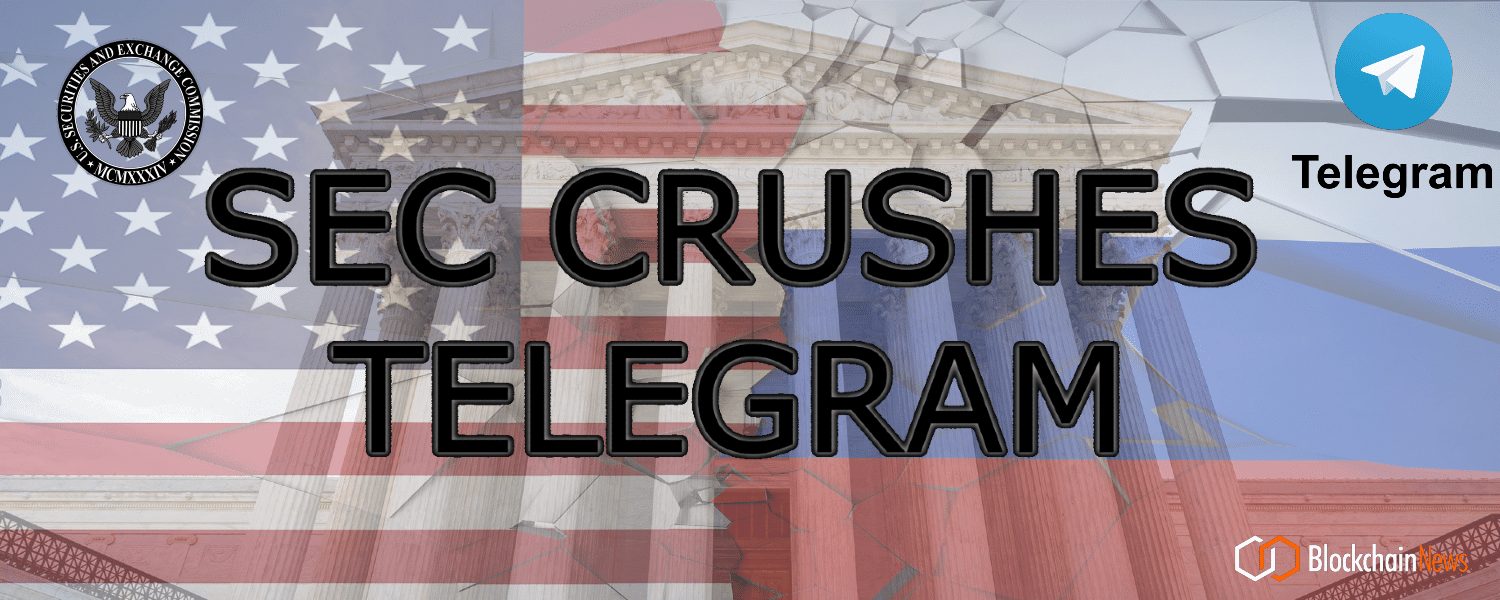The Russian Telegram Open Network (TON) blockchain its gram cryptocurrency experienced a massive legal setback with a fresh injunction granted by Southern District of New York Judge P. Kevin Castel which agrees with the U.S. Securities and Exchange Commission (SEC), that TON’s plans amount to the distribution of securities, and require compliance with section 5 of the US Securities Act of 1933.
In early 2018, Telegram received $1.7 billion from 175 sophisticated entities and high net-worth individuals in exchange for a promise to deliver 2.9 billion Grams and Telegram believes the agreements to sell the 2.9 billion Grams are lawful private placements of securities covered by an exemption.
Telegram believes that only the agreements for Gram tokens with the individual purchasers are securities., that the cryptocurrency will not be delivered to these purchasers until the launch of Telegram’s new Telegram Open Network (TON) Blockchain. Telegram believes the anticipated resales of Grams by the 175 purchasers into a secondary public market via the TON Blockchain as wholly-unrelated transactions and argues they would not be the offering of securities.
Of course, the SEC sees things differently. They say the 175 initial purchasers are underwriters that will soon participate in a distribution of Grams in public where new participants will not have the same level of data that a registration statement would show.
More from the court document:
“Cryptocurrencies (sometimes called tokens or digital assets) are a lawful means of storing or transferring value and may fluctuate in value as any commodity would. In the abstract, an investment of money in a cryptocurrency utilized by members of a decentralized community connected via blockchain technology, which itself is administered by this community of users rather than by a common enterprise, is not likely to be deemed a security under the familiar test laid out in S.E.C. v. W.J. Howey Co., 328 U.S. 293, 298–99 (1946). The SEC, for example, does not contend that Bitcoins transferred on the Bitcoin blockchain are securities. The record developed on the motion for a preliminary injunction presents a very different picture.”
“The Court finds that the SEC has shown a substantial likelihood of success in proving that the contracts and understandings at issue, including the sale of 2.9 billion Grams to 175 purchasers in exchange for $1.7 billion, are part of a larger scheme to distribute those Grams into a secondary public market, which would be supported by Telegram’s ongoing efforts. Considering the economic realities under the Howey test, the Court finds that, in the context of that scheme, the resale of Grams into the secondary public market would be an integral part of the sale of securities without a required registration statement.”
“Telegram knew and understood that reasonable purchasers would not be willing to pay $1.7 billion to acquire Grams merely as a means of storing or transferring value. Instead, Telegram developed a scheme to maximize the amount initial purchasers would be willing to pay Telegram by creating a structure to allow these purchasers to maximize the value they receive upon resale in the public markets.”
An appeal has allegedly been filed by Telegram.
SECTION 5 OF THE SECURITIES ACT OF 1933
15 U.S.C. § 77e (1988)
(a) Unless a registration statement is in effect as to a security, it shall be unlawful for any person, directly or indirectly:
- to make use of any means or instruments of transportation or communication in interstate commerce or of the mails to sell such security through the use or medium of any prospectus or otherwise; or
- to carry or cause to be carried through the mails or in interstate commerce, by any means or instruments of transportation, any such security for the purpose of sale or for delivery after sale.
(b) It shall be unlawful for any person, directly or indirectly:
- to make use of any means or instruments of transportation or communication in interstate commerce or of the mails to carry or transmit any prospectus relating to any security with respect to which a registration statement has been filed under this title unless such prospectus meets the requirements of section 10; or
- to carry or cause to be carried through the mails or in interstate commerce any such security for the purpose of sale or for delivery after the sale, unless accompanied or preceded by a prospectus that meets the requirements of subsection (a) of section 10.
(c) It shall be unlawful for any person, directly or indirectly, to make use of any means or instruments of transportation or communication in interstate commerce or of the mails to offer to sell or offer to buy through the use or medium of any prospectus or otherwise any security, unless a registration statement has been filed as to such security, or while the registration statement is the subject of a refusal order or a stop order or (prior to the effective date of the registration statement) any public proceeding or examination under section 8.







